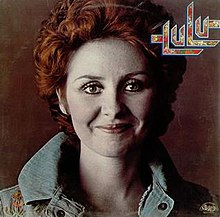
The Rascals are an American rock band, formed in Garfield, New Jersey, United States, in 1965.

Rock Me Baby is the second solo album release from David Cassidy. It was produced by Wes Farrell for Bell Records, and released in 1972. The album introduced some rock, soul and R&B flavors in a calculated move by Cassidy to expand beyond his teen idol image. AllMusic's Al Campbell wrote that the blue-eyed soul album was officially produced by Farrell, but the song selections and styles showed that Cassidy was also making decisions.

Felix Cavaliere is an American musician. He is best known for being the co-lead vocalist and keyboard player for The Young Rascals.

Freedom Suite is the fifth studio album by rock band The Rascals, released on March 17, 1969. It peaked at number 17 on the Billboard Top LPs chart and also reached number 40 on the Billboard Black Albums chart, the last Rascals album to appear there.

Peaceful World is the eighth studio album by rock band The Rascals, released on May 5, 1971. It peaked at number 122 on the Billboard 200 chart. In Canada, the album reached number 50. The single "Love Me" reached number 95 on the Billboard Hot 100.
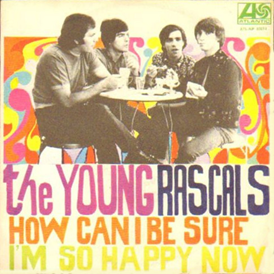
"How Can I Be Sure" is a popular song written by Felix Cavaliere and Eddie Brigati, and originally recorded by the Young Rascals for their 1967 album Groovin' with a single release in August 1967 affording the group their fourth Top 10 hit.

Aretha In Paris is a live album by American singer Aretha Franklin, released in 1968, by Atlantic Records. The album was recorded in Paris, France, on May 7, 1968. It reached the top 20 of Billboard's album chart. It was reissued on compact disc through Rhino Records in the 1990s.
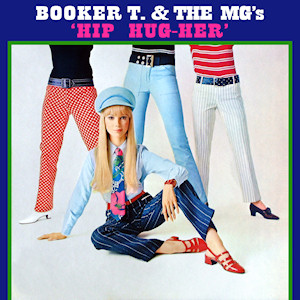
Hip Hug-Her is the fifth studio album by the Southern soul band Booker T. & the M.G.'s, released on Stax Records in June 1967. The title track was the band's most successful single since their debut, "Green Onions" while their cover of the Young Rascals song "Groovin'" was also a hit. The album was their last to be produced by Stax co-founder Jim Stewart, because the band started to produce themselves starting with Doin' Our Thing. The title track Hip Hug-Her is featured during the opening credits of the feature film Barfly (1987) with Mickey Rourke and Faye Dunaway.
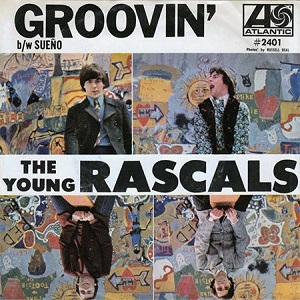
"Groovin'" is a song written by the American singer songwriters Felix Cavaliere and Eddie Brigati, initially recorded by their group the Young Rascals in 1967. Cavaliere was inspired to compose the song by his girlfriend Adrienne Buccheri, whom he only got to meet every Sunday amidst heavy touring and recording. Musically, the song differs from most of band's previous output, leaving the garage rock genre for Latin American influences, such as baião. Lyrically, "Groovin'" tells the tale of a narrator spending time with his partner on a Sunday afternoon. The song was arranged and recorded at the Talentmasters Studios, New York City in March of 1967.

Time Peace: The Rascals' Greatest Hits is a greatest hits album from the Rascals, released on June 24, 1968. It reached number one on the Billboard Pop Albums chart by September 1968. It also topped the Cash Box albums chart with a run in the Top 10 for 20 consecutive weeks

Once Upon a Dream is the fourth studio album by the rock band the Rascals, released February 19, 1968. The album rose to number 9 on the Billboard Top LPs chart and number 7 on the R&B chart.
David Brigati is an American singer. He is sometimes known as "the fifth Rascal".
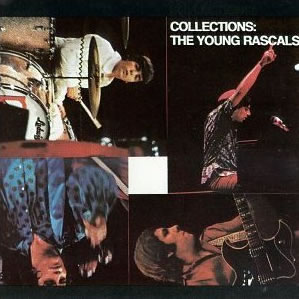
Collections is the second album by the rock band the Young Rascals. The album was released on January 9, 1967 and rose to #15 on the Billboard Top LPs chart, and #8 in Canada.

Groovin' is the third album by the rock band the Young Rascals. The album was released on July 31, 1967 and rose to #5 on the Billboard Top LPs chart, number 7 on the R&B chart, and number 2 in Canada. Eight of the songs were released on singles with the title track reaching number 1 on the Pop chart in the U.S.

See is the sixth studio album by rock band The Rascals, released on December 15, 1969. It peaked at number 45 on the Billboard 200. In Canada, it reached number 11. Three singles were released from the album, although the third one was "I Believe" backed with "Hold On".

Search and Nearness is the seventh studio album by rock band the Rascals, released on March 1, 1971. It was the last album featuring Eddie Brigati and Gene Cornish as well as the group's last album released on Atlantic Records.
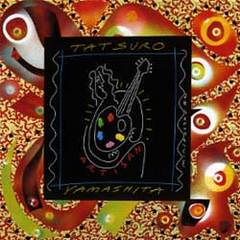
Artisan is the thirteenth studio album recorded by the Japanese singer-songwriter Tatsuro Yamashita. It was released in June 1991, led by a string of hit singles he produced. Artisan became his first album that was not released on LP. Like his 1989 live album Joy, illustration for a front cover of Artisan was drawn by Andre Miripolsky, who painted a cover art of Bette Midler's 1983 No Frills album. It debuted at the No. 1 on the Oricon, and spent 20 weeks on chart with sales of over 710,000 copies in total. In December 1991, the album won the 33rd Japan Record Awards for "Best Pop/Rock Album" and "Excellent Albums" prizes.

The Very Best of The Rascals is a compilation album from the Rascals released on July 20, 1993 by Rhino/Atlantic. This compilation contains nearly all of their Atlantic singles, in chronological order, released from 1965 through 1970. The first nine singles are performed by the Young Rascals, while the last seven tracks are credited to the Rascals.

Greatest Hits is a compilation album by David Cassidy, initially released in 1974 by Bell Records.

Magic Fingers is an album by guitarist Chuck Loeb and pianist Andy LaVerne recorded in 1989 and released on the DMP label.
